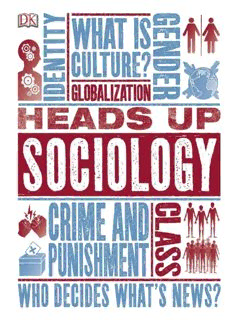
Heads Up Sociology PDF
Preview Heads Up Sociology
Contents HOW TO USE THIS eBOOK What is SOCIOLOGY? What do SOCIOLOGISTS DO? RESEARCH methods Who AM I? What is my IDENTITY? GIRLS and BOYS WOMEN and work Biography: JUDITH BUTLER What’s my TRIBE? Does RACE matter? Biography: ELIJAH ANDERSON Who do you LOVE? AGE and society What does FAMILY mean? Are we all MIDDLE CLASS now? Biography: KARL MARX Identity: IN CONTEXT Does society EXIST? What do schools TEACH? Are INSTITUTIONS a good thing? Biography: CHARLES WRIGHT MILLS Who holds the POWER? What role does RELIGION play in society? Does RELIGION still MATTER? RURAL life versus URBAN life A sense of COMMUNITY Biography: MAX WEBER WHY do we WORK? How is work CHANGING? Biography: ARLIE HOCHSCHILD WATCHING the workers Social institutions: IN CONTEXT When it all goes WRONG Why do people commit CRIMES? Biography: ÉMILE DURKHEIM BREAKING society’s RULES White-collar CRIME Are we all on CAMERA? WHODUNNIT? Biography: HOWARD BECKER HEALTH and equality Not FITTING in Crime and health: IN CONTEXT Why is the world so UNFAIR? Super-RICH! Wealth and STATUS The POVERTY trap Who’s to BLAME? Where did RACISM come from? Why haven’t developing countries DEVELOPED yet? Biography: BOAVENTURA DE SOUSA SANTOS Is GLOBALIZATION a good thing? GLOCALIZATION Biography: SASKIA SASSEN What’s our IMPACT on the PLANET? Biography: ANTHONY GIDDENS Wealth and development: IN CONTEXT Modern CULTURE I SHOP therefore I am? What is CULTURE? Biography: PIERRE BOURDIEU LEISURE time We are living in UNCERTAIN times Biography: ZYGMUNT BAUMAN Does the MASS MEDIA affect YOU? Who owns the MEDIA? Who DECIDES what’s news? Where do you get your NEWS from? What does the INTERNET DO for us? Do you live ONLINE? Culture and the media: IN CONTEXT Directory of sociologists Glossary Acknowledgements Imprint How to use this eBook Preferred application settings For the best reading experience, the following application settings are recommended: Colour theme: White background Font size: At the smallest point size Orientation: Landscape (for screen sizes over 9”/23cm), Portrait (for screen sizes under 9”/23cm) Scrolling view: [OFF] Text alignment: Auto-justification [OFF] (if the eBook reader has this feature) Auto-hyphenation: [OFF] (if the eBook reader has this feature) Font style: Publisher default setting [ON] (if the eBook reader has this feature) Images: Double tap on the images to see them full screen ARE MEN AND WOMEN REALLY THAT DIFFERENT? WHY ARE SOME PEOPLE SUPER-RICH WHEN OTHERS ARE HOMELESS? WHY DO SOME PEOPLE COMMIT CRIMES? THESE ARE SOME OF THE QUESTIONS AT THE HEART OF LIFE AS A HUMAN BEING AND IF YOU HAVE ASKED QUESTIONS LIKE THESE, THEN YOU ARE ALREADY A BUDDING SOCIOLOGIST. SOCIOLOGY IS THE STUDY OF SOCIETY BUT IT IS ALSO A FRESH WAY OF THINKING ABOUT THE WORLD. Sociologists, the people who study sociology, are interested in the ways in which individuals, groups, and societies are shaped and how they interact with each other. They look at how social institutions such as the family, the education system, religions, and governments work, and consider the ways in which they impact on people’s lives. Sociology emerged at the end of the 18th century, when large parts of the world were changing rapidly because of increasing industrialization. German philosopher, Karl Marx, and other thinkers of the time, were concerned with the growing inequality they saw. They wanted to understand what was happening and the effect it was having on people and societies. Sociology is a social science that uses a range of methods to investigate the social world. Using evidence and logic, it develops and tests theories such as Marxism and feminism, which can help this process. To be a sociologist also requires what US sociologist Charles Wright Mills called the “Sociological Imagination” – the ability to challenge common sense ideas about the world and to ask new questions. For instance, we might ask “Why do we have problems like racism and homophobia?” or “Does the news tell the truth?” Most importantly, sociology offers the possibility of understanding our lives more fully and of making them better. As Polish sociologist Zygmunt Bauman said, the purpose of sociology is “to come to the help of the individual”.
Description: